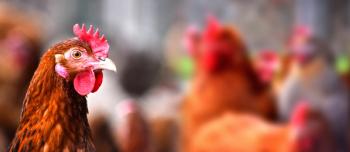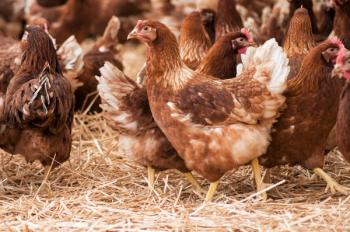
Coalition throws cautionary statement on McDonald's antibiotic use policy
Washington, D.C.-McDonald's Corp.'s policy calling for its suppliers to stop using growth promoters and curtail use of antibiotics in food animals has drawn cautionary reaction from the Coalition for Animal Health (CAH).
Washington, D.C.-McDonald's Corp.'s policy calling for its suppliers to stop using growth promoters and curtail use of antibiotics in food animals has drawn cautionary reaction from the Coalition for Animal Health (CAH).
What is the single greatest threat to Your long-term success in food animal practice?
The McDonald's Antibiotics Use Policy will be enforced through supplier certification and assurance programs or regular audits. The policy for the company will be phased in by the end of 2004. The fast-food giant had 2002 total sales of $41.5 billion.
CAH's 12 members include the Animal Health Institute, American Veterinary Medical Association (AVMA), American Association of Swine Veterinarians and the National Cattlemen's Beef Association.
McDonald's Corp.'s decision calls for its suppliers worldwide to phase-out animal growth promotion antibiotics that are used in human medicine. The "global policy on antibiotics" also creates a set of standards for McDonald's direct meat suppliers and encourages indirect suppliers to take similar steps to eliminate growth-promoting antibiotics and to reduce other antibiotic use.
Dr. Lyle Vogel, director of scientific activities for AVMA, tells DVMNewsmagazine that the association met with the company early in the process of developing a position to offer input.
Vogel explains, "We want to retain use of antibiotics in feed to prevent and control disease. Any policy to the contrary would have animal health and welfare impacts if uses were curtailed without a public health reason."Vogel adds that AVMAwas "somewhat gratified"to see the company did not create a sweeping policy to curtail antibiotic therapeutic uses.
McDonald's Corp. says in a prepared statement, "As a company committed to social responsibility, we take seriously our obligation to understand the emerging science of antibiotic resistance, and to work with our suppliers to foster real, tangible changes in our own supply community, and hopefully beyond," says Frank Muschetto, senior vice president of Worldwide Supply Chain Management at McDonald's Corp.
"McDonald's is asking producers that supply over 2.5 billion pounds of chicken, beef and pork annually to take actions that will ultimately help protect public health," the company says.
CAH says in a statement about the new policy, "We remain committed to a rigorous science-based regulatory process. All antibiotics approved by the Food and Drug Administration (FDA) undergo thorough tests for efficacy, animal safety and human safety. In addition, new FDA guidance will require that all proposed new antibiotic products and all existing antibiotics undergo risk assessment to determine the potential for increasing antibiotic resistance."
Make it science-based
CAH continues, "In this market-based, rather than science-based policy, the products McDonald's is asking suppliers not to use have been subjected to the FDA-approval process and proven to be safe. We caution about actions not grounded in science."
McDonald's Global Policy on Antibiotics Use in Food Animals was developed by a broad-based coalition of organizations. In July 2002, McDonald's joined forces with Environmental Defense, an environmental advocacy organization and a partner with McDonald's on a range of initiatives since 1989, and Elanco Animal Health, an animal pharmaceutical company, to create an Antibiotics Coalition.
New policy in the making
Other members of the coalition included McDonald's suppliers Tyson Foods and Cargill. Also participating in the coalition were Brigham and Women's Hospital physician Dr. Thomas O'Brien, Oxford University animal welfare expert Dr. Marian Dawkins and Bon Appétit Management Company. The Meridian Institute facilitated the coalition process, the company reports.
"By working together, McDonald's and Environmental Defense have leveraged the company's purchasing power to help reverse the trend of antibiotics overuse in animal agriculture," says Gwen Ruta, program director for Environmental Defense. "McDonald's new policy demonstrates that reducing antibiotic use is both feasible and affordable."
Direct relationship suppliers are those dedicated to McDonald's business and directly control the stages of animal production where antibiotic use decisions are made. The majority of McDonald's worldwide poultry supply falls into this category. Direct suppliers must certify annual compliance with the policy. Tyson Foods is a direct supplier of poultry to McDonald's.
In 2001, McDonald's USA decided to discontinue all uses of the antibiotic class of fluoroquinolones with its poultry supply.
McDonald's policy will also be encouraged for indirect suppliers, which includes most beef and pork suppliers. For indirect relationship suppliers, McDonald's Global Policy on Antibiotics Use offers incentives for compliance with the policy and other actions that may reduce the potential for antibiotic resistance.
For more information about the policy go to:
Newsletter
From exam room tips to practice management insights, get trusted veterinary news delivered straight to your inbox—subscribe to dvm360.




